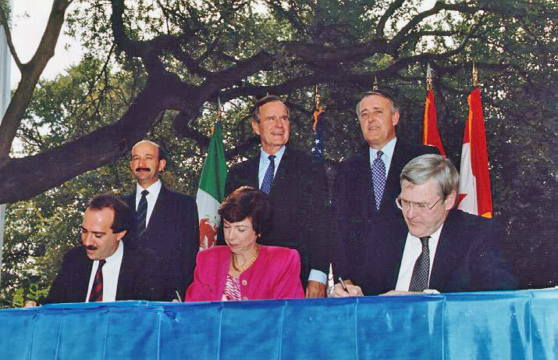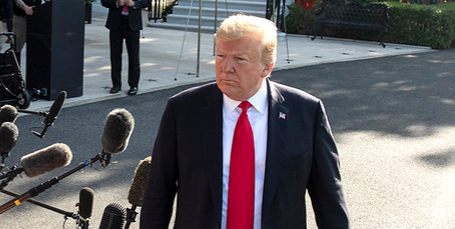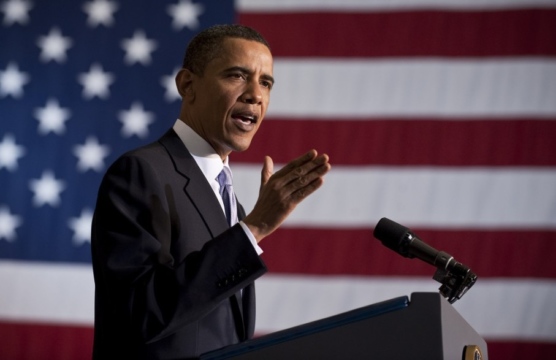
What are the Best Options for Modernizing NAFTA?
How significant of a priority should strengthening NAFTA be as compared to other trade agreements?
A Daily Publication of The Dialogue
U.S. President Donald Trump announced last week that he would impose new tariffs that could rise as high as 25 percent on all of Mexico’s exports to the United States unless Mexico “substantially stops” the flow of migrants coming to the United States. What effect will the tariffs have on the economies of both countries, and how has the private sector reacted? Will the duties, which Trump announced less than two weeks after the United States reached a deal with Mexico and Canada to eliminate steel and aluminum tariffs, derail the pending ratification of the USMCA trade accord? What other developments could affect the USMCA’s ratification? Will the USMCA be ratified during Trump’s current term in office?
James R. Jones, member of the Advisor board, chairman of Monarch Global Strategies and former U.S. ambassador to Mexico: “Trump’s latest half-baked trade tweet policy introduces a new level of uncertainty into the global economic outlook that doesn’t bode well for either the United States or Mexico. The first problem is that this decision was based on very faulty information. Second, the solution aims at the wrong target. The third is that it invites tariff retaliation by Mexico and very likely other countries that will deepen the economic danger to us. And finally, it could derail movement on the USMCA trade treaty designed to strengthen North American competitiveness and protect and promote vital economic interests in the United States. This appears to be motivated primarily by political considerations, not economic, as a way to motivate the Trump base, which generally opposes both immigration and fair trade. Business abhors uncertainty, and uncertainty will be the result unless the administration quickly clarifies some of the unknowns, such as what specifically will trigger imposition or acceleration of tariffs. If the meetings this week between U.S. Secretary of State Mike Pompeo and Mexican Foreign Minister Marcelo Ebrard and his delegation can make common sense from this mess, I think that there is a reasonably good chance that Congress can approve the USMCA before the August congressional recess. The two key factors to make that happen are organized labor and House Speaker Nancy Pelosi. Both have expressed an open mind on the trade proposal and in my judgment would like to find a way to support it.”
Andrés Rozental, member of the Advisor board, president of Rozental & Asociados in Mexico City and senior policy advisor at Chatham House: “President Trump’s threats against Mexico are nothing new, but this time he has tried to combine three of his campaign promises into one huge gamble: tariffs on Mexican exports as his way of showing he’s reduced his country’s trade deficit, trying to force Mexico into securing its southern border to slow migration pressures on the United States and telling his base that Mexico is, after all, paying for the wall at the U.S.-Mexico border. None of these measures will, however, alter the fact that tariffs hurt the U.S. private sector and consumers above all and will lead to an economic crisis in Mexico, that migrants will always find ways to get to the United States as long as the situation in their countries remains unchanged, and that in the end American tax-paying farmers, manufacturers and consumers will pay for the wall—if it ever gets built. Although Mexico and Canada nevertheless seem ready to move ahead with USMCA ratification as a way of limiting the ability of Congress to reopen negotiations on aspects of the agreement that mostly Democrats would like to change, the chances of getting the deal through the U.S. approval process this year are still slim. The political window for the Democratic leadership to bring the USMCA to the House for a vote is rapidly closing, and there doesn’t seem to be much of a congressional appetite to give President Trump the symbolic victory that he wants for his re-election. In any case, the almost unanimous U.S. private sector pushback against Trump’s unprecedented and probably illegal trade measures against Mexico will ultimately determine whether any of the supposed solutions he hopes to achieve will in fact materialize.”
Carlo Dade, director of the Centre for Trade and Investment Policy at the Canada West Foundation and member of the Mexican Council on Foreign Relations: “The actual announcement of the proposed tariffs came as a shock, but that something like this happened should not have come as a surprise. If the ratification process is to succeed, then building in expectation and contingencies for these types of shocks is necessary. Part of the surprise over the announcement in Canada was due to how well the visit to Ottawa by U.S. Vice President Mike Pence to support ratification of the new agreement had gone. The tariff announcement was a reminder not to get lulled into a false sense of a return to normalcy. The new tariff threat came at the same time that a U.S. congressional staff delegation was preparing to visit Mexico to assess the country’s recent labor reforms passed as a requirement for ratification of the new NAFTA agreement. An already tense situation, Mexico acceding to U.S. demands, has been made worse. This shows an apparent lack of any strategic or even short-term planning or thought, something else that must be factored in by Canada and Mexico going forward. The tariffs announcement also shows that a new NAFTA agreement does not bring certainty to the North American trade relationship. While it will improve business confidence in specific areas, it will not mitigate the largest cause of uncertainty—unilateral exercise of tariff authority ceded to the administration by the Congress. Last month, the U.S. Commerce department concluded that lack of auto production and research in the United States was a security threat and the president can impose tariffs under section 232 of the 1962 trade act. These are the same tariffs just lifted for Canada and Mexico on steel and aluminum. Even though the U.S. administration has said Canada and Mexico are not targets for potential new auto tariffs, neither were the two countries given any ironclad guarantee that this will not change through, for example, a presidential tweet.”
Nicolás Mariscal, member of the Advisor board and chairman of Grupo Marhnos in Mexico City: “The mere announcement by President Donald Trump of new tariffs on all Mexican exports to the United States, beginning June 10, has already had an impact on both economies by affecting the exchange rate. If the plan comes into effect, the tariffs will be paid not only by Mexican exporters, but also by families in both countries, without addressing the immigration problems at the border. Any obstacle to trade across the U.S.-Mexico border will have a cascading effect on employment, investment and growth in both countries. Last year, imported goods to the United States from Mexico amounted to $346.5 billion. A 5 percent tariff would result in a potential tax increase on American businesses and consumers of $17 billion. In case the tariffs reach the ceiling of 25 percent, that number could increase to $86 billion. The announcement came on the day the United States-Mexico-Canada Agreement (USMCA) was submitted to Congress, and it should not be perceived as a coincidence. The threats could definitely harm the process to approve the USMCA. Even if one of the signatories withdraws from the existing North American Free Trade Agreement, Mexican exporters would face an average tariff of less than 5 percent, which is where Trump’s threat begins. A worse scenario would likely oblige Mexico to reconsider the passing of USMCA or delay it until the situation is resolved. The possibility of a trade war no longer seems far-fetched.”
Tamara Kay, associate professor of global affairs and sociology at the University of Notre Dame: “President Trump’s threat to impose tariffs on all Mexican products was aimed less at Mexico than at Democrats who are pushing back against his trade and immigration policy agendas. And it is likely to backfire. President Trump has to convince House Speaker Nancy Pelosi to bring the USMCA to the floor, and convince her and a significant number of Democrats to vote for it. There are two reasons the Democrats may not want to pass the USMCA in its current form. First, the agreement lacks ‘swift and certain enforcement’ of labor and environmental standards. It also has provisions that would allow pharmaceutical companies to charge high prices for medicine. Labor unions, environmental organizations and consumer rights groups, working with key Democrats, are demanding the inclusion of enforcement mechanisms and the elimination of provisions that will lock in high drug prices. Second, Pelosi and the Democrats may not support the USMCA because they do not want to give President Trump a victory on NAFTA before the 2020 elections. They will likely argue that his USMCA does not transform NAFTA, but actually replicates provisions that hurt the environment and consumers, and most importantly, key parts of his base—manufacturing workers who will not get their jobs back under his new NAFTA. If he doesn’t deliver on NAFTA, Democratic presidential candidates will have a strong message going into 2020 that the president who claims to be the best dealmaker, and who promised to renegotiate or terminate NAFTA, came up short.”
The Latin America Advisor features Q&A with leaders in politics, economics, and finance every business day. The publication is available to members of the Dialogue's Corporate Program and others by subscription.
How significant of a priority should strengthening NAFTA be as compared to other trade agreements?
How will the change affect the countries’ trade relationship? What will be the economic impact in the United States and Mexico?
At the Summit of the Americas, Obama will have the opportunity to show off the historic changes in US policy toward Latin America.
 President Donald Trump last Thursday announced that the United States would impose new tariffs on imports from Mexico beginning June 10, saying the country has failed to stop flows of migrants from coming to the United States. // File Photo: White House.
President Donald Trump last Thursday announced that the United States would impose new tariffs on imports from Mexico beginning June 10, saying the country has failed to stop flows of migrants from coming to the United States. // File Photo: White House.

